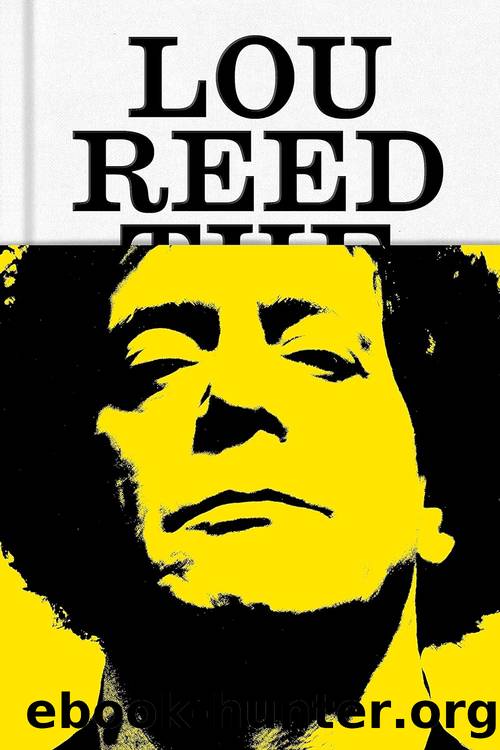Lou Reed by Will Hermes

Author:Will Hermes
Language: eng
Format: epub
Publisher: Farrar, Straus and Giroux
* * *
Early that summer, Reed engaged an idea that mustâve felt like a lightning strikeâa project that couldâve met his high standards for merging art and commerce, addressed his financial struggles, moved him to the center of the pop culture conversation, and reunited him with a man he loved and admired. Reedâs talks about staging Berlin with Warhol, whose multifaceted career was as successful as ever, hadnât borne fruit. But after getting an early look at his friendâs aphoristic memoir The Philosophy of Andy Warhol (From A to B and Back Again), due that fall, Reed began developing ideas for a musical based on it.
Whether Reed had discussed the project with Warhol or just surprised him with a tape is unclear. But on an undated BASF C-90 cassette titled Philosophy Songs (From A to B & Back), Reed worked through a dozen song sketches, working out lyrics that reflected Warholâs life and ideas over rudimentary acoustic guitar riffs, with traffic noise in the background, as if recording in his apartment with the window open. Some songs conjured his first-person voice, echoing familiar quips about fame, sex, and Coca-Cola. Reed touches on the presentational heroics of âdrag queensâ (âambulatory archives of ideal moviestar womanhood,â as Warhol described them in Philosophy), the artistâs notion of a âput-on,â and the aestheticization of his hard lean into commerce. (âBeing good in business is the most fascinating kind of art,â Warhol affirmed in the book, âmaking money is art and working is art and good business is the best art.â) Other songs took a third-person POV. Thereâs humor: Warholâs dog shitting in the aisle of his local Gristedes grocery store; a high-concept Warhol doll that, when you wind it up, does nothing. Other observations are nastierâabout Warholâs cheapness, coldness, chronic skin problems, sex lifeâperhaps channeling Factory characters talking shit about their mentor, or possibly Reedâs own venting, at a man with whom he had a complex relationship. Tellingly, Reed offers an apology at the end of the demo, recalling the apologies he made to his ex-wife for the personal details he used in Berlin.
With a selection of Reedâs recent concert recordings on the B side, the cassette was a thorny blend of artmaking, business proposition, and the sort of mixtape one might make for a lover, to express feelings impossible to articulate in conversation. Warholâs take on the project, or indeed, whether he ever even listened to the tape, is unclear. For his part, Reed bragged about writing it all in a day, telling a writer from Circus magazine he had two hoursâ worth of music, and that Warhol wanted to do the musical with David Cassidy, with whom Reed seemed slightly obsessed at the time. Sometime later, he told his friend Mick Rock that heâd played the demos for Warhol, and theyâd in fact put him off.
âHe was fascinated, but horrified,â Reed said. âI think they kind of scared him. But Iâm thinking of doing it as my next album.â
It didnât work out that way, and nothing more came of the project.
Download
This site does not store any files on its server. We only index and link to content provided by other sites. Please contact the content providers to delete copyright contents if any and email us, we'll remove relevant links or contents immediately.
| Classical | Country & Folk |
| Heavy Metal | Jazz |
| Pop | Punk |
| Rap & Hip-Hop | Rhythm & Blues |
| Rock |
Cecilia; Or, Memoirs of an Heiress — Volume 2 by Fanny Burney(31956)
Cecilia; Or, Memoirs of an Heiress — Volume 3 by Fanny Burney(31941)
Fanny Burney by Claire Harman(26602)
We're Going to Need More Wine by Gabrielle Union(19046)
Plagued by Fire by Paul Hendrickson(17412)
All the Missing Girls by Megan Miranda(16026)
Cat's cradle by Kurt Vonnegut(15353)
For the Love of Europe by Rick Steves(14121)
Bombshells: Glamour Girls of a Lifetime by Sullivan Steve(14075)
Leonardo da Vinci by Walter Isaacson(13336)
4 3 2 1: A Novel by Paul Auster(12392)
The remains of the day by Kazuo Ishiguro(8999)
Adultolescence by Gabbie Hanna(8927)
Note to Self by Connor Franta(7671)
Diary of a Player by Brad Paisley(7577)
Giovanni's Room by James Baldwin(7346)
What Does This Button Do? by Bruce Dickinson(6207)
Ego Is the Enemy by Ryan Holiday(5448)
Born a Crime by Trevor Noah(5382)
